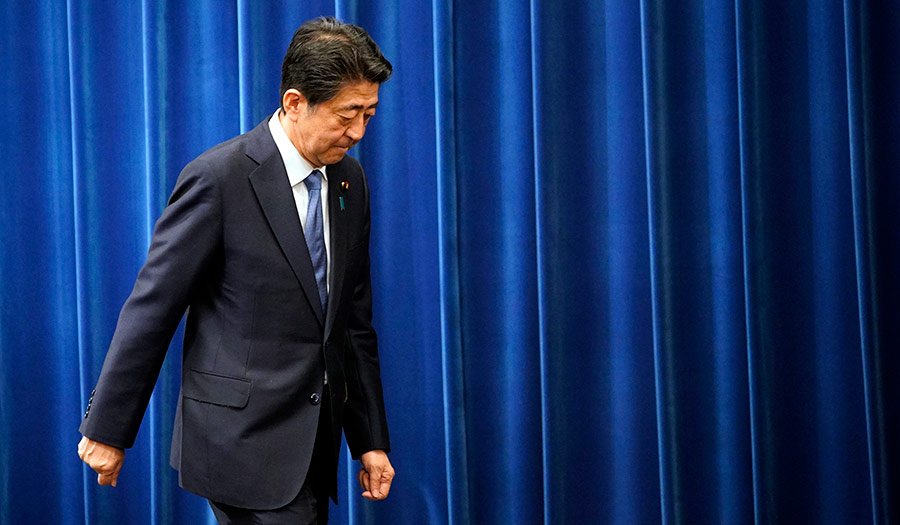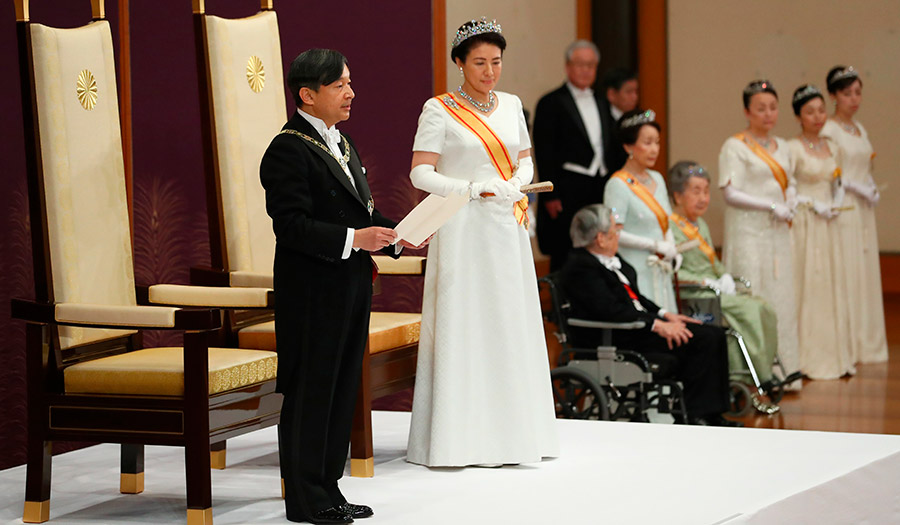 Franck Robichon/Pool Photo via AP
Franck Robichon/Pool Photo via AP
World News Desk
Learn the why behind the headlines.
Subscribe to the Real Truth for FREE news and analysis.
Subscribe NowJapan’s longest-serving prime minister, Shinzo Abe, said Friday he is stepping down because a chronic health problem has resurfaced. He told reporters that it was “gut wrenching” to leave many of his goals unfinished.
His abrupt departure triggers a leadership battle in his Liberal Democratic Party (LDP) over the next few weeks. The winner will likely stick to Mr. Abe’s reflationary “Abenomics” policies that had mixed results in resuscitating the world’s third-largest economy.
Mr. Abe has had ulcerative colitis since he was a teenager and has said the condition was controlled with treatment. Concerns about his health began this summer and grew this month when he visited a Tokyo hospital two weeks in a row for unspecified health checkups. He is now on a new treatment that requires IV injections, he said. While there is some improvement, there is no guarantee that it will cure his condition and so he decided to step down after treatment Monday, he said.
“It is gut wrenching to have to leave my job before accomplishing my goals,” Mr. Abe said Friday, mentioning his failure to resolve the issue of Japanese abducted years ago by North Korea, a territorial dispute with Russia and a revision of Japan’s war-renouncing constitution.
“Faced with the illness and treatment, as well as the pain of lacking physical strength…I decided I should not stay on as prime minister when I’m no longer capable of living up to the people’s expectations with confidence,” the 65-year-old said at a news conference.
At times during his news conference he choked up and blinked back tears.
“I apologize from the bottom of my heart that despite all of the support from the Japanese people, I am leaving the post with one full year left in my term,” Mr. Abe said.
News of Mr. Abe’s resignation sent tremors through Tokyo financial markets. Japan’s main stock market, which has more than doubled under Mr. Abe, fell some 2 percent before recovering, while the yen rose on concerns of a return to deflation.
In a country once known for its short-tenured prime ministers, the departure marks the end of an unusual era of stability that saw the Japanese leader strike up strong ties with U.S. President Donald Trump even as Mr. Abe’s nationalism riled the Koreas and China. While he pulled Japan out of recession, the economy has been battered anew by the coronavirus pandemic, and Mr. Abe has failed to achieve his cherished goal of formally rewriting the U.S.-drafted pacifist constitution because of poor public support.
“The coronavirus’s impact on the economy was a blow to Abe, who was stuck at home and lacking an opportunity to make any achievement or show off his friendship with Trump, and was pushed into a corner,” said Koichi Nakano, an international politics professor at Sophia University in Tokyo.
Although Mr. Abe left many of his political goals unfinished, he continued to bolster Japan’s defense capability to respond to its ally America’s needs. “For those who believe the Japan-U.S. alliance is paramount, that was his major achievement,” Mr. Nakano said.
Mr. Abe, whose term ends in September 2021, is expected to stay on until a new party leader is elected and formally approved by the parliament.
Mr. Abe became Japan’s youngest prime minister in 2006, at age 52, but his first stint abruptly ended a year later because of his health.
In December 2012, Mr. Abe returned to power, prioritizing economic measures. He won six national elections and built a rock-solid grip on power, bolstering Japan’s defense role and capability and its security alliance with the U.S. He also stepped up patriotic education at schools and raised Japan’s international profile.
Mr. Abe on Monday became Japan’s longest-serving prime minister by consecutive days in office, eclipsing the record of Eisaku Sato, his great-uncle, who served 2,798 days from 1964 to 1972.
Mr. Abe said he will focus on his treatment for now and “continue his political activity and support a new administration as a lawmaker.”
This article contains information from Reuters and The Associated Press
- Real Truth Magazine Articles
- ASIA
 Can Japan Achieve Beautiful Harmony?
Can Japan Achieve Beautiful Harmony?
Other Related Items:
More on Related Topics:
- In Cambodia, Thousands Flood Out of Scam Compounds and Find Little Help
- Syrian Government, Kurds Agree to International Deal in ‘Historic Milestone’
- How Syria’s Government Has Redrawn the Map with Advances Against the Kurds
- Explainer: What’s Happening in Yemen, and Why Are Saudi Arabia and the UAE Involved?


